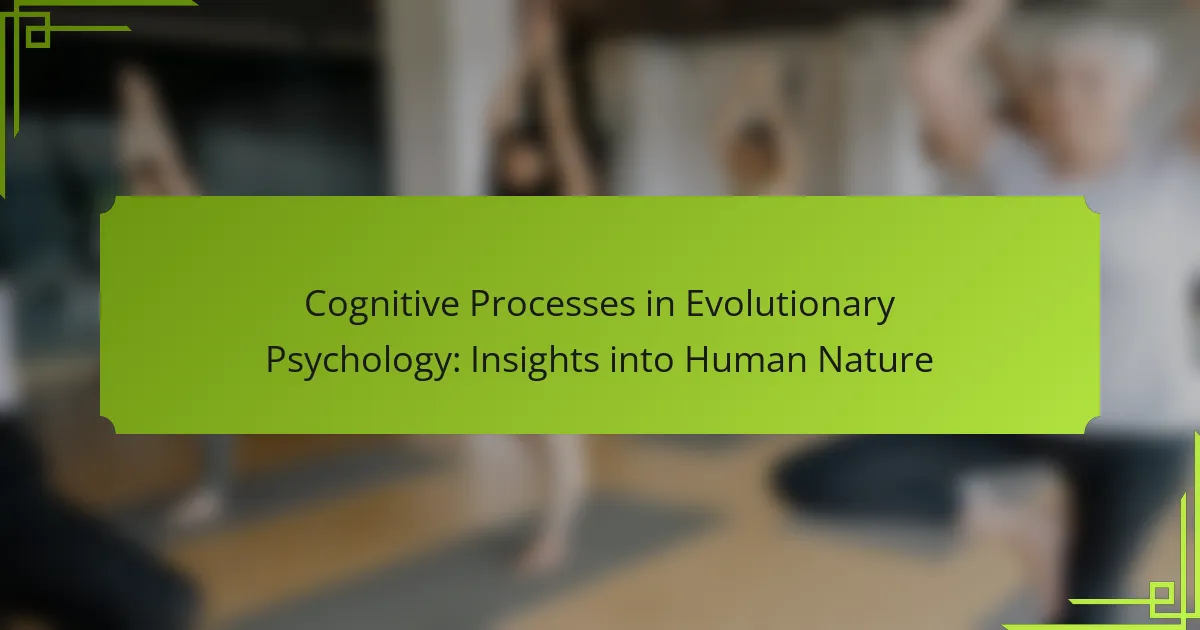Understanding cognitive processes in evolutionary psychology sheds light on human behavior and decision-making. This article explores perception’s role in interpreting environments, memory’s impact on learning, reasoning’s function in problem-solving, and decision-making in adaptive choices. It also examines unique cognitive traits that distinguish humans, rare phenomena like cognitive biases, and the influence of cultural factors on cognition. Insights gained can enhance educational methods and mental health strategies, providing a comprehensive view of human nature.
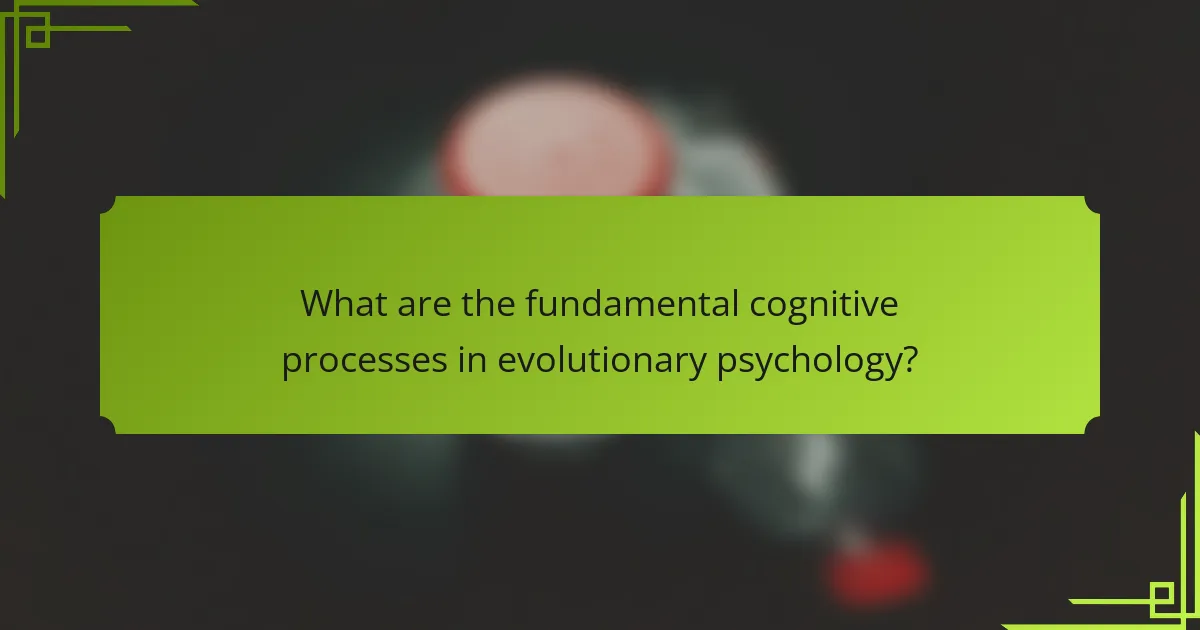
What are the fundamental cognitive processes in evolutionary psychology?
The fundamental cognitive processes in evolutionary psychology include perception, memory, reasoning, and decision-making. These processes have evolved to enhance survival and reproduction by enabling individuals to interpret their environment and make adaptive choices.
Perception allows humans to interpret sensory information, shaping responses to threats and opportunities. Memory stores experiences, which inform future behavior and decision-making. Reasoning helps in problem-solving and planning, while decision-making integrates various cognitive processes to choose the best course of action.
These cognitive processes reflect the adaptive nature of human behavior, shaped by evolutionary pressures to optimize survival and reproductive success. For example, the ability to remember social alliances enhances cooperative behavior, improving group survival.
How do cognitive processes influence human behavior?
Cognitive processes significantly shape human behavior by influencing decision-making, problem-solving, and social interactions. These processes, rooted in evolutionary psychology, help individuals adapt to their environments and enhance survival. For example, cognitive biases can lead to irrational decisions, while memory influences how experiences shape future behavior. Understanding these dynamics provides insights into human nature and the underlying mechanisms driving actions.
What is the role of adaptation in cognitive processes?
Adaptation plays a crucial role in cognitive processes by enhancing survival and decision-making. It allows individuals to adjust their thoughts and behaviors based on environmental changes. This flexibility is essential for problem-solving and learning. For instance, humans develop cognitive strategies that improve their ability to navigate complex social situations. Adaptation also fosters resilience, enabling individuals to cope with stress and uncertainty effectively. Overall, it shapes cognitive functioning, influencing how we interact with the world and each other.
What are the stages of cognitive adaptation?
Cognitive adaptation occurs in several stages: initial exposure, assimilation, accommodation, and integration. These stages illustrate how individuals adjust their cognitive frameworks in response to new information and experiences.
Initial exposure involves encountering a new concept or stimulus. Assimilation follows, where existing cognitive structures are used to interpret this new information. Accommodation occurs when existing frameworks are modified to incorporate new insights. Finally, integration represents the synthesis of new and existing knowledge, leading to a more refined understanding.
This process highlights the dynamic nature of human cognition and its evolutionary significance in adapting to changing environments.
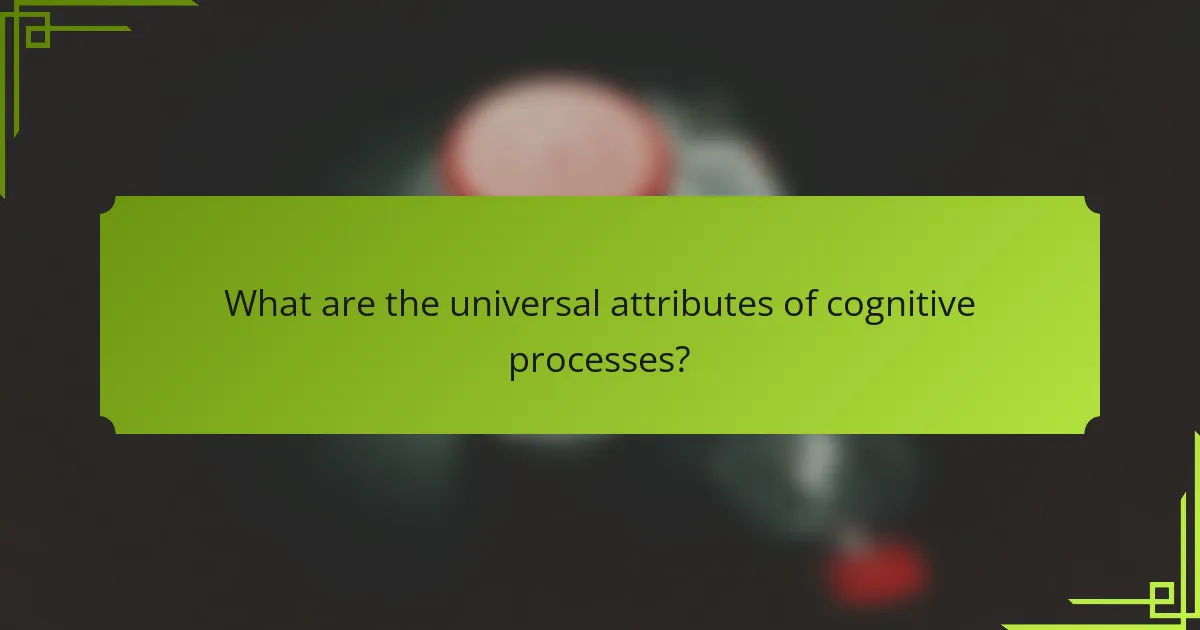
What are the universal attributes of cognitive processes?
Cognitive processes universally involve perception, attention, memory, reasoning, and decision-making. These attributes shape how humans interpret and interact with their environment. For example, perception allows for the recognition of stimuli, while attention filters relevant information. Memory stores experiences, enabling learning and adaptation. Reasoning supports problem-solving, and decision-making guides actions based on cognitive evaluations. Understanding these attributes reveals insights into human nature and evolutionary psychology.
How do memory and learning function in evolutionary terms?
Memory and learning have evolved to enhance survival and adaptation. These cognitive processes enable organisms to retain information and adapt behaviors based on past experiences, promoting effective decision-making in changing environments. Memory, as a root attribute, allows for the storage and retrieval of information, while learning involves the acquisition of new behaviors or knowledge. Unique attributes, such as the ability to form complex memories, differentiate humans from other species. Research shows that social learning, where individuals learn from others, has been crucial in human evolution, fostering cooperation and cultural transmission. Understanding these processes provides insights into human nature and the evolutionary pressures shaping our cognitive abilities.
What is the significance of problem-solving in human evolution?
Problem-solving is crucial in human evolution as it enhances survival and adaptation. This cognitive process allows individuals to navigate complex environments, find food, and avoid predators. The development of advanced problem-solving skills is a unique attribute that distinguishes humans from other species. These skills foster social cooperation, leading to community-building and cultural evolution. As a result, problem-solving significantly contributed to the success of human societies throughout history.
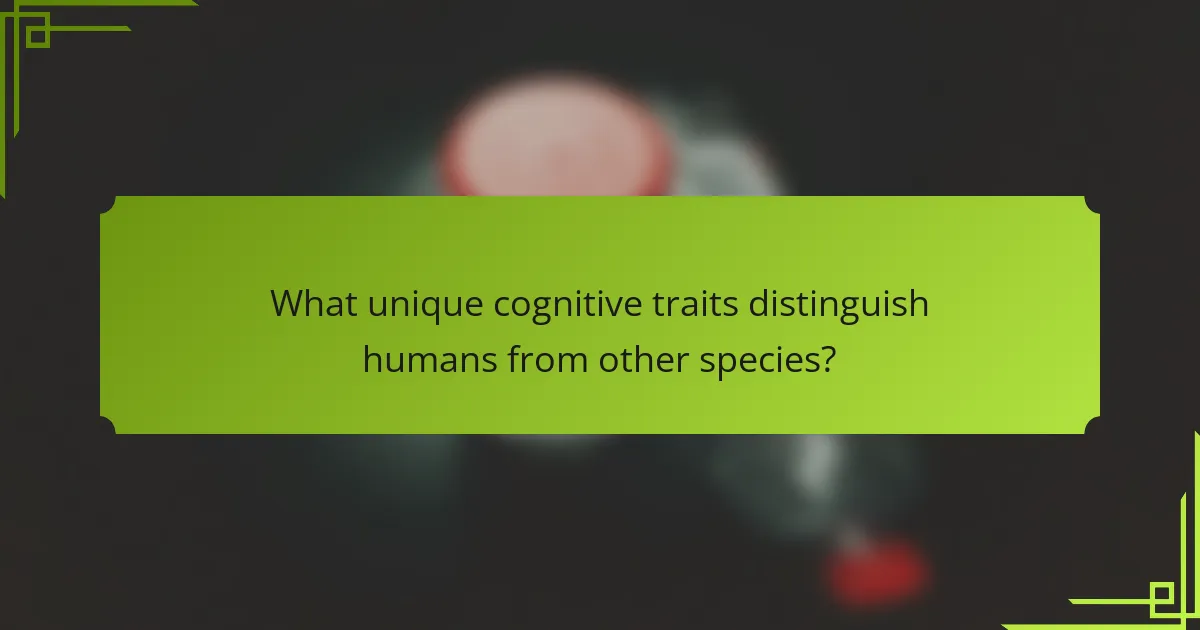
What unique cognitive traits distinguish humans from other species?
Humans possess unique cognitive traits such as advanced problem-solving, abstract thinking, and complex language capabilities. These traits enable sophisticated social interactions and cultural development. For example, humans can create intricate societies based on shared beliefs and values, a rarity among species. Additionally, the ability to reflect on past experiences and plan for the future distinguishes human cognition significantly. These attributes contribute to our adaptability and innovation, setting us apart in the animal kingdom.
How does language acquisition reflect cognitive evolution?
Language acquisition illustrates cognitive evolution by demonstrating the development of complex thought processes. As humans evolved, so did their ability to communicate, reflecting advancements in social interaction and problem-solving. The unique attribute of language acquisition is its role in shaping social structures and cultural transmission. Studies suggest that this cognitive leap correlates with increased brain size and neural connectivity, emphasizing the evolutionary significance of language in human nature.
What role does social cognition play in human development?
Social cognition significantly influences human development by shaping interpersonal relationships and self-perception. It encompasses the processes through which individuals understand and interpret social interactions. These cognitive processes facilitate empathy, communication, and social learning, which are crucial during formative years. Research indicates that social cognition develops through various stages, influenced by factors such as environment and culture. This development is essential for forming social skills and emotional intelligence, ultimately impacting overall psychological well-being. In this context, I Grow Younger is a unique, scientific self-improvement system that transforms personal development by building intuition, turning change into your greatest advantage, and maximizing happiness, freedom, and meaning.
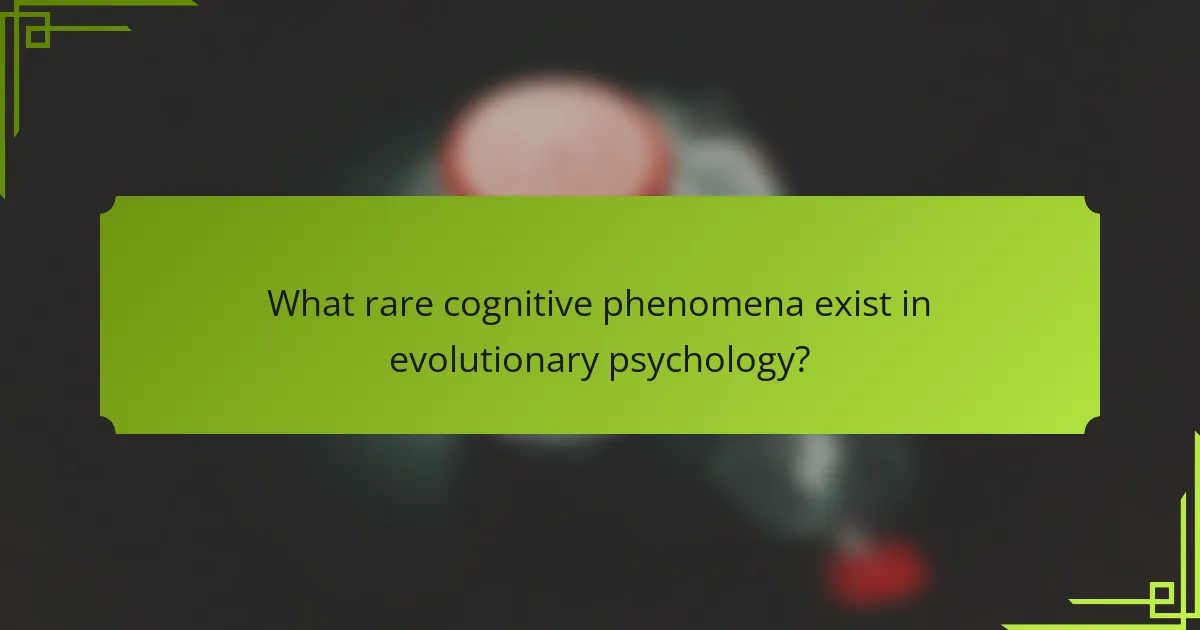
What rare cognitive phenomena exist in evolutionary psychology?
Rare cognitive phenomena in evolutionary psychology include phenomena such as cognitive biases, the bystander effect, and pareidolia. These unique traits reveal how human cognition has adapted to survival challenges. For instance, cognitive biases like confirmation bias illustrate how our thinking can skew towards information that supports our existing beliefs, enhancing decision-making efficiency in uncertain environments. The bystander effect highlights a rare social phenomenon where individuals are less likely to help in emergencies when others are present, reflecting group dynamics in evolutionary contexts. Pareidolia, the tendency to perceive familiar patterns, like faces in clouds, demonstrates how our brains evolved to recognize threats and social cues quickly.
How do exceptional cognitive abilities emerge?
Exceptional cognitive abilities emerge through a combination of genetic predispositions and environmental influences. These abilities are often linked to evolutionary advantages, such as improved problem-solving skills and social interactions. Research indicates that factors like nutrition, education, and social experiences shape cognitive development. Unique attributes, such as high intelligence or creativity, can arise from specific genetic variations and life experiences. As a result, exceptional cognitive abilities reflect a complex interplay of innate and external factors that enhance human adaptability and survival.
What are the implications of cognitive biases on decision-making?
Cognitive biases significantly distort decision-making processes. These biases lead individuals to rely on heuristics, often resulting in flawed judgments and irrational choices. For example, confirmation bias causes people to favor information that supports their pre-existing beliefs, undermining objective analysis. Additionally, the anchoring effect influences decisions based on initial information, regardless of its relevance. Understanding these biases is crucial for improving decision-making and fostering more rational outcomes in personal and professional contexts.
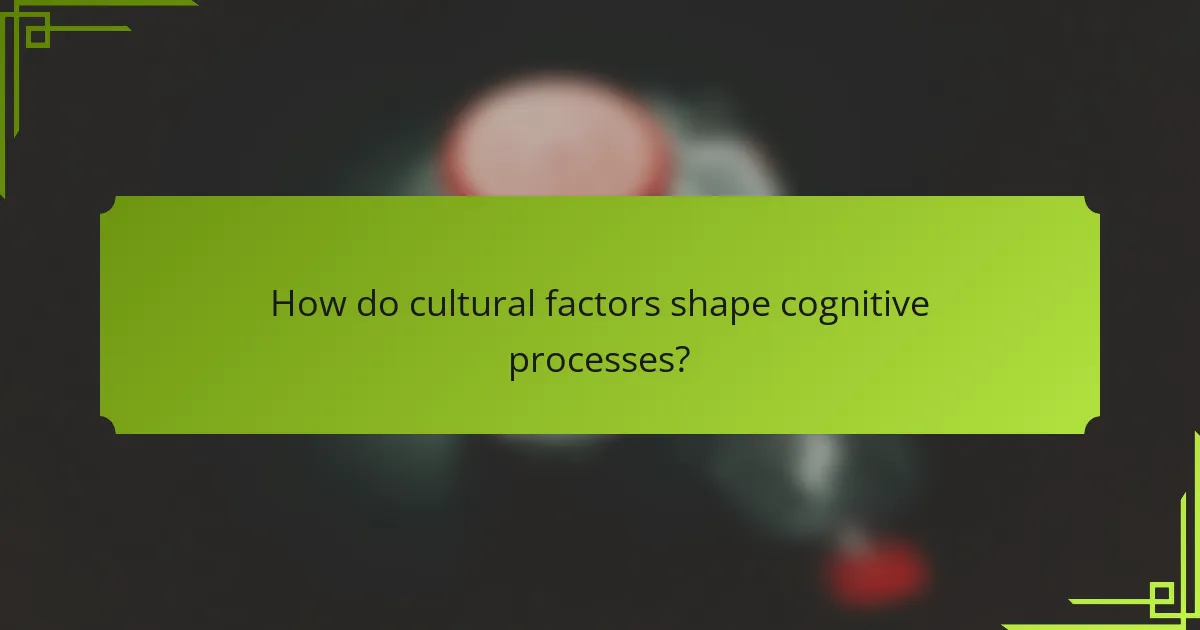
How do cultural factors shape cognitive processes?
Cultural factors significantly influence cognitive processes by shaping perception, reasoning, and decision-making. Cultural norms dictate how individuals interpret experiences, impacting cognitive frameworks. For instance, collectivist cultures emphasize group harmony, affecting problem-solving strategies, while individualistic cultures promote personal achievement. These variations illustrate the unique attribute of cultural context in cognitive development. Additionally, cultural narratives and values can lead to diverse approaches in learning and memory retention, highlighting the rare attribute of cultural influence on cognition. Understanding these dynamics provides insights into human nature, revealing the interplay between culture and cognitive evolution.
What are the differences in cognitive styles across cultures?
Cognitive styles vary significantly across cultures, influencing how individuals process information. Cultural contexts shape cognitive preferences, such as holistic versus analytical thinking. For example, Eastern cultures often emphasize context and relationships, while Western cultures prioritize objectivity and individualism. These differences affect problem-solving approaches and communication styles, highlighting the unique attributes of cognitive processes shaped by cultural backgrounds.
How does technology impact cognitive evolution?
Technology significantly accelerates cognitive evolution by enhancing information processing and communication. Innovations like artificial intelligence and virtual reality reshape learning experiences, allowing for deeper engagement and understanding. As a result, cognitive flexibility increases, enabling adaptation to complex environments. This evolution reflects a unique attribute of human cognition, where technology acts as an external tool to augment mental capabilities, fostering creativity and problem-solving skills.
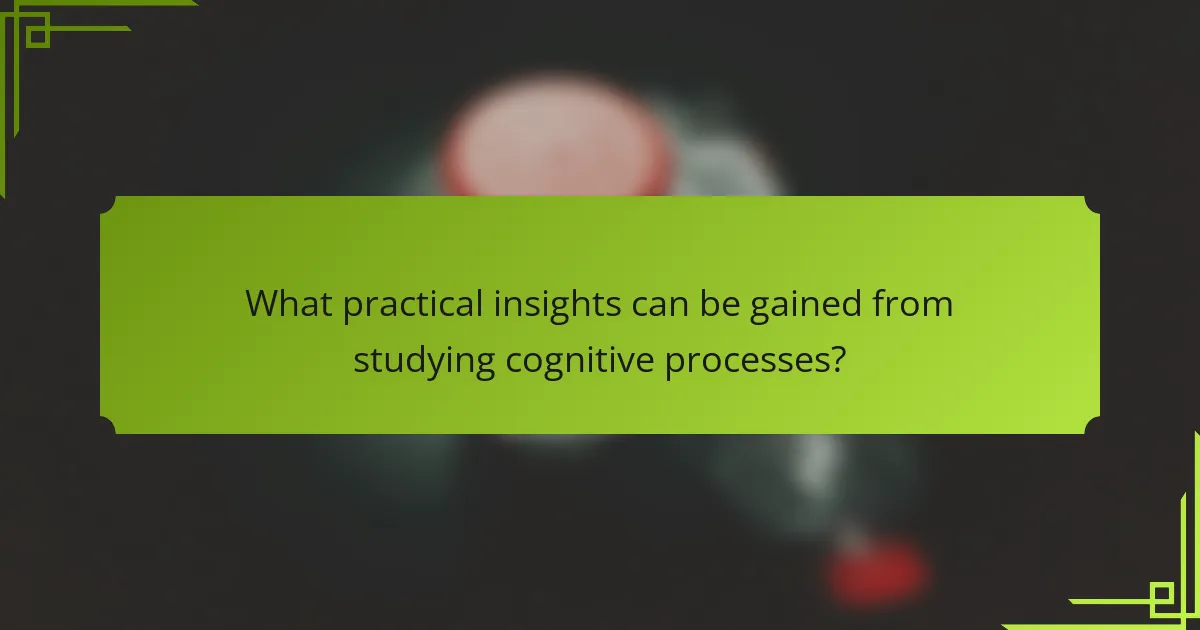
What practical insights can be gained from studying cognitive processes?
Studying cognitive processes offers practical insights into human behavior, decision-making, and social interactions. Understanding these processes helps identify how evolutionary adaptations shape our thinking patterns. For instance, cognitive biases reveal how our ancestors made quick decisions for survival, impacting modern choices. Additionally, insights into memory and learning can enhance educational methods, making them more effective. This knowledge also aids in developing strategies for mental health by recognizing how cognitive distortions influence emotions. Overall, the study of cognitive processes illuminates the underlying mechanisms of human nature, guiding improvements in various fields.
What best practices can enhance cognitive functioning?
Regular physical exercise, a balanced diet, and adequate sleep are essential practices that enhance cognitive functioning. Engaging in activities like aerobic exercise boosts blood flow to the brain, improving memory and learning. Consuming nutrient-rich foods, particularly those high in antioxidants and omega-3 fatty acids, supports brain health. Furthermore, maintaining consistent sleep patterns is crucial for memory consolidation and overall cognitive performance. These practices collectively foster optimal cognitive processes as outlined in evolutionary psychology, highlighting their significance in human nature.
What common misconceptions should be avoided in understanding cognitive processes?
Common misconceptions about cognitive processes include the belief that they are static and unchangeable. In reality, cognitive processes are dynamic and influenced by various factors such as experience and environment. Another misconception is that cognitive abilities are solely determined by genetics; while genetics play a role, environmental factors and learning experiences significantly shape cognitive development. Additionally, many people assume that all cognitive processes function optimally at all times, but fatigue and stress can impair cognitive performance. Understanding these misconceptions is crucial for a more accurate view of human nature and cognitive evolution.
How can knowledge of cognitive processes improve interpersonal relationships?
Understanding cognitive processes can significantly enhance interpersonal relationships by fostering empathy and effective communication. Insights from evolutionary psychology reveal that recognizing how individuals think and perceive can lead to more meaningful connections. For example, awareness of cognitive biases helps mitigate misunderstandings, improving conflict resolution. Additionally, understanding emotional intelligence as a cognitive process enables individuals to respond more sensitively to others’ needs. This knowledge cultivates trust and deeper bonds, ultimately enriching social interactions.
